A B2B eCommerce platform is a digital system that enables businesses to sell products or services to other businesses online. In 2025, the global B2B eCommerce market is valued at $30.1 trillion and expected to reach $44.5 trillion by 2029. That massive scale underscores that B2B digital commerce is fast becoming the backbone of global trade.
As more companies shift their B2B operations online, choosing the right platform has become essential to stay competitive. In this article, LitExtension will explore the 12 best B2B eCommerce platforms to grow your business, as shown in the table below:
Platform | Key features | Suitable for |
Built-in B2B tools, custom catalogs, automated workflows, strong app ecosystem | Fast-growing brands needing a simple yet scalable B2B SaaS solution | |
Multi-storefront support, headless APIs, custom pricing, ERP/CRM integrations | Mid-to-large retailers seeking flexibility and easy integration | |
Advanced personalization, headless architecture, AI (Adobe Sensei), RFQ workflows | Large enterprises needing deep customization and content-driven commerce | |
AI merchandising, account hierarchies, omnichannel order management, CRM connectivity | Enterprises wanting AI automation and full Salesforce ecosystem integration | |
Real-time buyer insights, custom catalogs, unified data, omnichannel fulfillment | Global enterprises prioritizing ERP-level integration and intelligence | |
Contract management, quote workflows, complex product configuration, native SAP ERP link | Global B2B corporations using SAP systems and managing complex operations | |
Native ERP integration, personalized catalogs, bulk ordering, flexible pricing | Mid-sized manufacturers and distributors already using Microsoft Dynamics or SAP | |
Digital showrooms, visual catalogs, order management, buyer portals | Fashion, apparel, and lifestyle brands focused on visual wholesale selling | |
Open-source flexibility, built-in CRM, quote management, multi-organization setup | B2B companies needing tailored workflows and open-source customization | |
ERP integrations, pricing controls, multi-warehouse support, scalability | Mid-market B2B sellers needing strong functionality without enterprise costs | |
Customizable storefront, multi-store setup, quote extensions, open-source | Mid-sized businesses with in-house developers and limited budgets | |
Modular headless architecture, dynamic pricing, multi-store support, ERP integration | Growing B2B enterprises seeking flexibility and full control over infrastructure |
From this breakdown, it’s clear that every platform brings its own strengths. Before diving into the details of each one, let’s take a closer look at the must-have features that the best B2B eCommerce platform should include to effectively support your operations and long-term growth.
Best B2B eCommerce Platforms: Which is suitable for you?
To wrap up, here’s how each platform shines in this B2B eCommerce platform for enterprises:
- Shopify Plus and BigCommerce are great picks if you're looking for fast, flexible SaaS platforms that scale quickly without complex setup.
- Adobe Commerce Cloud and Salesforce Commerce Cloud offer powerful options for teams that need deep customization, data-driven insights, and advanced personalization tools.
- Oracle Commerce and SAP Commerce Cloud stand out for enterprises with complex operations that rely on tight ERP/CRM integrations and automation at scale.
- Sana Commerce and Cloudfy are best for growing B2B businesses that need strong ERP connectivity and ready-to-use tools without enterprise-level complexity.
- NuORDER by Lightspeed shines for brands that value visual merchandising and a modern, interactive wholesale experience.
- OroCommerce and Virto Commerce suit companies seeking open-source flexibility, deep customization, and full control over their infrastructure.
- OpenCart is ideal for mid-sized sellers who want affordable customization and the freedom to build tailored B2B features.
1. Shopify Plus
📌 Key takeaway: Shopify Plus is best suited for fast-growing B2B brands that value ease of use but still need advanced capabilities. It offers powerful automation, flexible pricing tools, and seamless integrations within a user-friendly ecosystem.
Shopify Plus is an enterprise-grade solution built for high-growth B2B businesses such as wholesalers, manufacturers, and distributors. It combines Shopify’s scalability and ease of use with advanced tools for managing complex B2B operations. For brands expanding into wholesale or B2B eCommerce, Shopify Plus offers the right balance of flexibility, automation, and simplicity to grow without technical hassle.
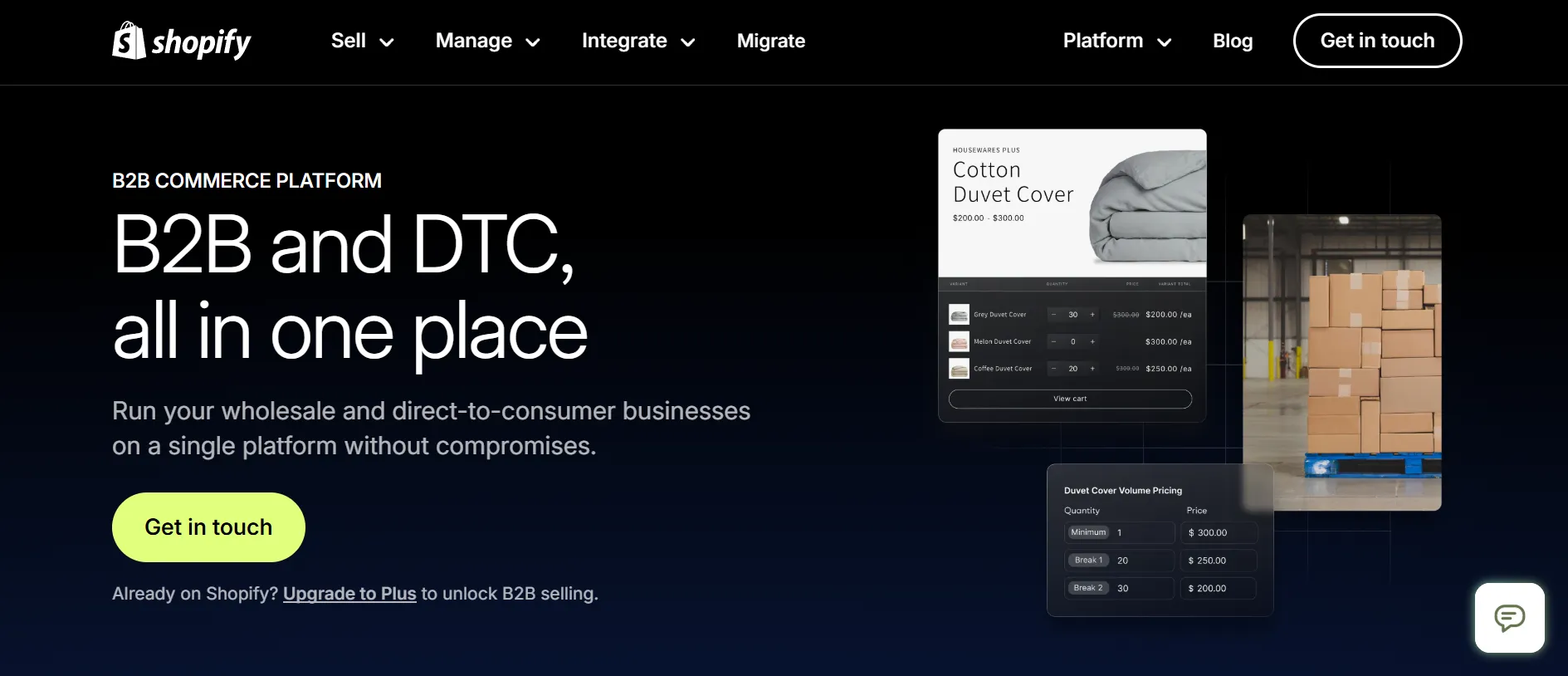
Shopify Plus Key B2B features
- Company accounts: Manage complex business relationships with multi-location company profiles, flexible payment terms, and custom checkout settings for each buyer.
- Custom catalogs and pricing: Personalize product availability and pricing based on contracts, markets, or buyer segments to create tailored wholesale experiences.
- Dedicated B2B checkout: Streamline wholesale orders with one-page checkout, draft orders, and price locking for negotiated deals.
- Self-serve customer accounts: Give B2B buyers full control to view order history, reorder items, manage locations, and submit returns independently.
- Shopify Flow automation: Automate routine workflows like order approvals, tagging, and invoicing to reduce manual effort.
- Shopify Markets integration: Localize your B2B experience by managing regional catalogs, currencies, and pricing through Shopify Markets.
- Trade theme and headless options: Create optimized B2B storefronts with Shopify’s Trade theme or build fully custom experiences using Hydrogen and the Storefront API.
- B2B APIs and integrations: Connect Shopify Plus with ERP, CRM, or accounting systems to sync data across your entire business.
Shopify Plus pricing starts at around $2,300 per month, with final costs depending on your transaction volume, customization needs, and feature use. While it’s positioned at the higher end of the market, this pricing reflects its enterprise-level scalability, security, and dedicated support.
Let Our Experts Handle Your Store Migration!
With the All-in-One Migration Service, our experts take care of everything, ensuring a seamless and stress-free migration.
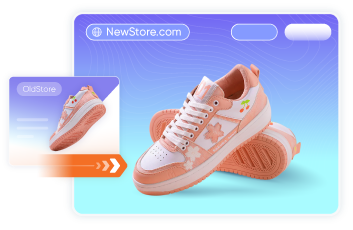
2. BigCommerce Enterprise
📌 Key takeaway:
BigCommerce Enterprise is a great fit for B2B and hybrid merchants who need enterprise power without the complexity of open-source platforms. Its strong API foundation, multi-storefront flexibility, and built-in B2B tools make it ideal for scaling efficiently.
Next, BigCommerce Enterprise stands out for combining enterprise-grade performance with the usability of a SaaS platform. It’s ideal for B2B and hybrid merchants that want flexibility without relying on heavy custom development. With open APIs and a strong partner ecosystem, BigCommerce enables rapid innovation and seamless integration across complex business systems.
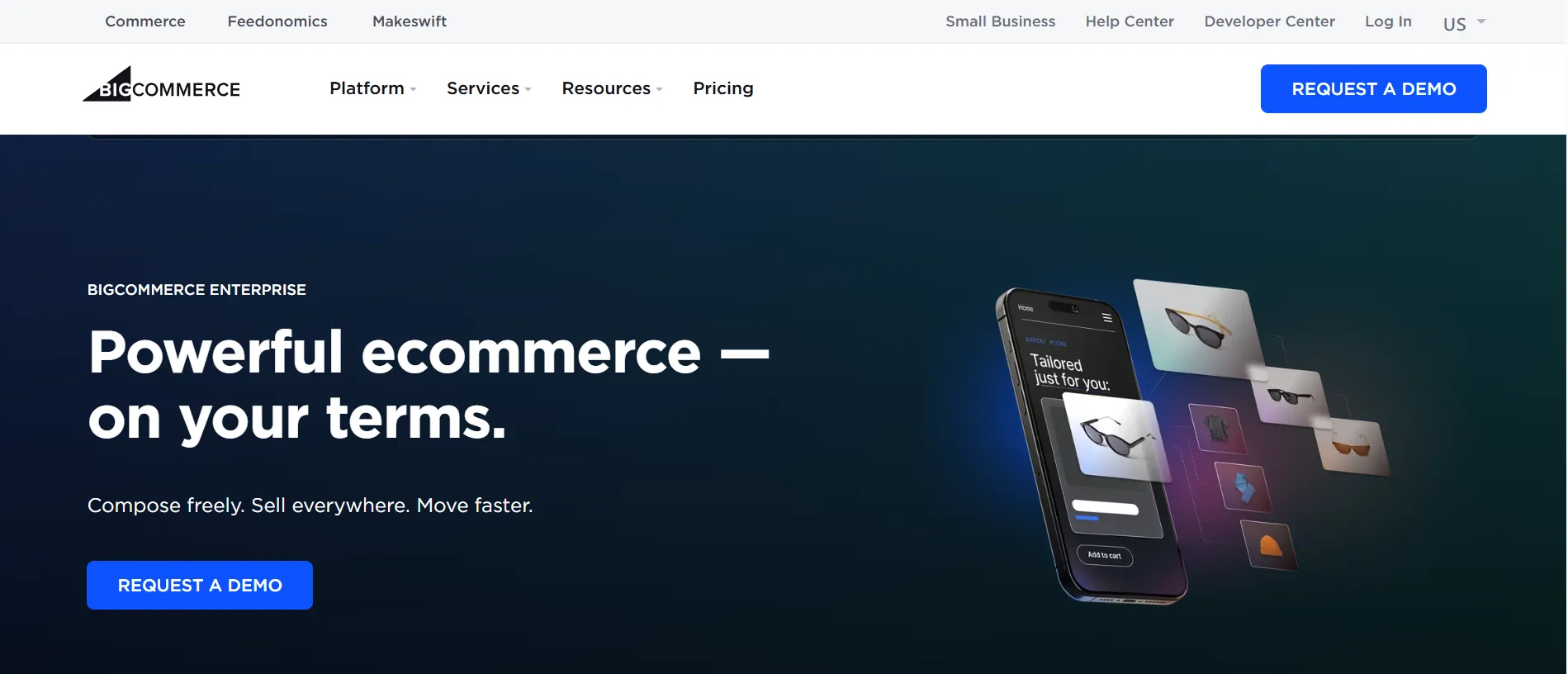
BigCommerce key features
- Company accounts and buyer roles: Manage multiple buyers under one account with specific roles, permissions, and approval workflows.
- Inventory and order management: Sync data across multiple channels and warehouses for accurate, real-time fulfillment.
- Quote management: Allow buyers to request quotes directly from the storefront and convert them into orders once approved.
- PunchOut and procurement integrations: Connect with leading procurement systems (such as Ariba, Coupa, or Jaggaer) for seamless corporate purchasing.
- Multi-storefront support: Manage multiple B2B storefronts, brands, or regions from a single BigCommerce backend.
- Sales representative tools: Allow sales reps to create quotes, share carts, and assist customers throughout the buying journey.
BigCommerce’s enterprise pricing is negotiable and tailored to each business, typically starting at around $1,500 per month. Based on our experience, merchants generating over $400,000 in annual GMV or operating multiple storefronts find it more worthwhile to upgrade. At that level, they can take full advantage of BigCommerce’s scalability, API flexibility, and advanced support.
For more insights, you can head to our detailed comparison on Shopify Plus vs BigCommerce Enterprise to see which one is a better fit for your business.
3. Adobe Commerce Cloud
📌 Key takeaway:
Adobe Commerce Cloud is built for enterprises that need full control and flexibility over their B2B operations. Its deep customization, AI-powered features, and advanced analytics make it ideal for managing complex global workflows.
Adobe Commerce Cloud, powered by Magento, is a highly flexible platform built for large-scale B2B operations. It combines advanced customization with AI-driven capabilities to support complex workflows and global selling. Designed for wholesalers, manufacturers, and enterprises, it delivers the scalability and control needed to manage and grow sophisticated B2B ecosystems.
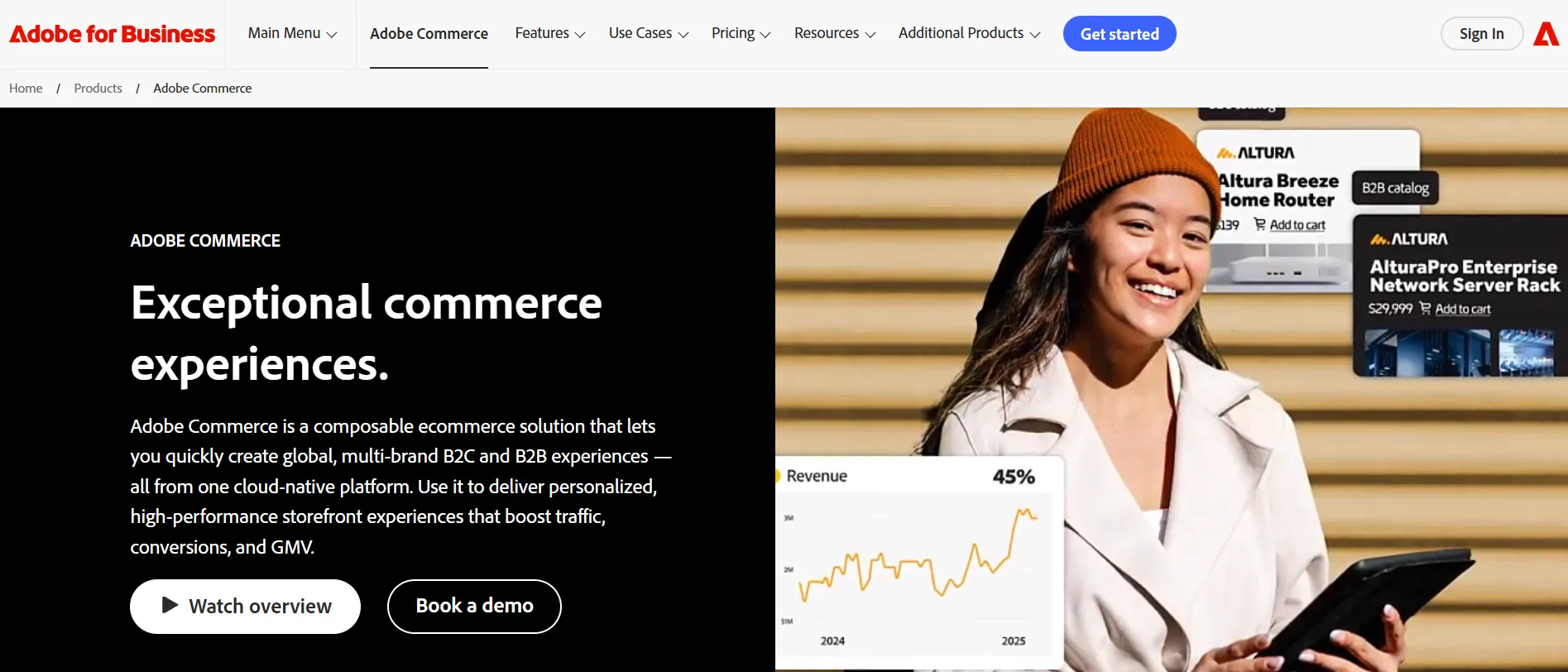
Key features of Adobe Commerce Cloud
- Company accounts and permissions: Manage multiple buyers under one organization with defined roles, budgets, and approval workflows.
- Request for Quote (RFQ): Allow buyers to negotiate pricing and terms directly within the storefront before completing a purchase.
- Quick order and requisition lists: Enable fast reordering by SKU upload or from previously saved product lists.
- Purchase orders and approval rules: Automate approval hierarchies and manage purchase order lifecycles across departments.
- Shared carts and collaborative purchasing: Let multiple team members build and review the same order for greater transparency.
- AI-powered personalization (Adobe Sensei): Provide intelligent recommendations and tailored promotions based on real-time buyer behavior.
- Advanced analytics and reporting: Use Adobe Analytics and Real-Time CDP to measure performance and optimize customer journeys.
Adobe Commerce Cloud pricing starts at around $40,000 per year and can exceed $200,000 annually, depending on sales volume, hosting configuration, and customization scope. This makes it considerably more expensive than platforms like Shopify Plus or BigCommerce, which typically cost a few thousand dollars per month.
However, the higher investment reflects its enterprise focus – offering unmatched flexibility, advanced integrations, and deep control over both infrastructure and experience. For large enterprises managing highly complex B2B operations, Adobe Commerce Cloud remains one of the most powerful yet premium options available.
4. Salesforce Commerce Cloud
📌 Key takeaway
Salesforce Commerce Cloud is best for enterprises that want a fully connected ecosystem where sales, service, and commerce work seamlessly together. Its AI-driven automation, native Salesforce integrations, and global scalability make it a top choice for complex organizations.
For enterprises aiming to unify sales, service, and commerce into one connected ecosystem, Salesforce Commerce Cloud stands out as a trusted solution. It’s built on Salesforce’s secure cloud infrastructure and powered by AI to help businesses deliver consistent, data-driven buying experiences. Beyond its robust integrations, the platform emphasizes operational efficiency, enabling teams to automate processes, adapt quickly to changing buyer needs, and maintain agility across global markets.
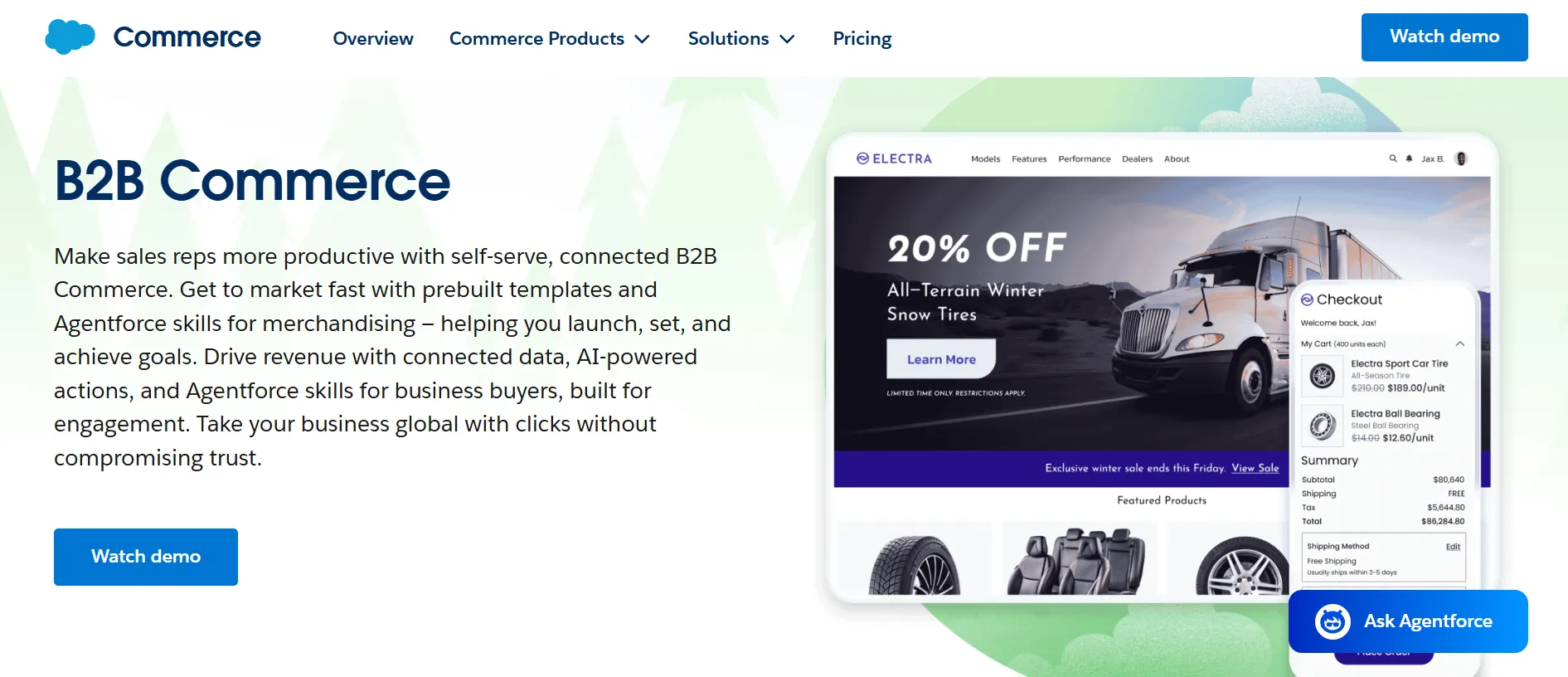
Key features of Salesforce Commerce Cloud
- Agentforce-powered merchandising & automation: Automate pricing updates, inventory changes, and promotions with Agentforce's AI tools – designed to speed up setup and boost sales with real-time data.
- Optimized B2B checkout & fulfillment: Support fast, flexible checkouts with preferred B2B payment terms, split shipments, multi-address shipping, and draft order flows.
- Headless commerce capabilities: Use out-of-the-box APIs to create modern, headless experiences across web, mobile, messaging apps, or even IoT interfaces.
- Unified analytics & inventory intelligence: Access 30+ built-in dashboards to monitor inventory status, customer lifetime value, top-performing products, and potential churn risks.
- Conversational & AI Commerce: Enable ordering and reordering through chat apps, natural language, or multimedia (such as images and videos), supported by AI assistance for faster transactions.
- Salesforce-native integration: Seamlessly connect B2B commerce with Sales Cloud, Service Cloud, and Marketing Cloud – enabling full visibility and unified workflows across teams.
- Multi-site, multi-currency, and localization: Launch and manage regional storefronts from a central hub, with localized pricing, language, and tax rules to support global operations.
That said, Salesforce typically charges a percentage of Gross Merchandise Value (GMV) – usually ranging from 1% to 3%, depending on the scale and agreement. For large enterprises with advanced requirements, the Salesforce B2B pricing can easily exceed $300,000/year, especially when factoring in add-ons like Data Cloud, AI features (Agentforce), and integration support.
5. Oracle Commerce
📌 Key takeaway
Oracle Commerce is built for large enterprises that prioritize intelligence, flexibility, and deep system integration. Its AI-driven insights and unified data model make it ideal for businesses managing complex buyer relationships at scale.
Oracle Commerce is among the most powerful B2B eCommerce platforms designed for enterprises that require a flexible, scalable, and highly customizable solution. What sets it apart is Oracle’s deep integration of AI across its ecosystem, which enables smarter insights, adaptive decision-making, and continuous optimization. Combined with its cloud-native foundation, Oracle Commerce gives large businesses the intelligence and agility needed to stay ahead in an evolving B2B landscape.
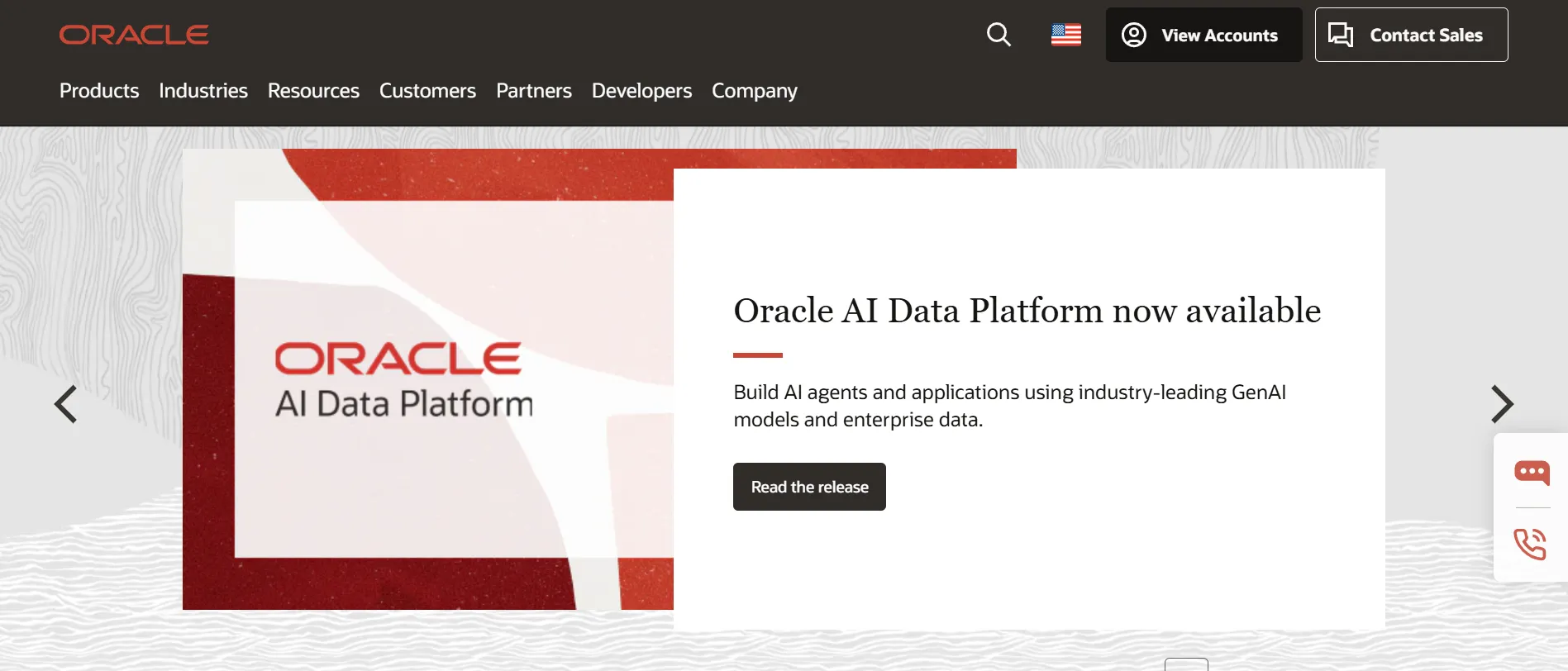
Key features of Oracle Commerce
- Interpret buyer signals with advanced intelligence: Oracle Commerce uses real-time data and AI to analyze buyer behavior. This enables you to deliver the right products and experiences at the right time.
- Deep customization per account: You can deliver fully tailored experiences with custom catalogs, negotiated pricing, and flexible payment terms specific to each business buyer.
- Unified customer data across systems: By integrating ERP, supply chain, and CRM data, Oracle enables a single source of truth. This empowers buyers to manage their own accounts and orders while streamlining operations for your team.
- AI-driven product recommendations: Intelligent upsell and cross-sell features respond to real-time buyer behavior, helping increase average order value and repeat purchasing in B2B environments.
- Scalable content management with drag-and-drop editing: Large catalogs and complex product structures are easier to manage with Oracle’s intuitive content tools.
From our experience and research, Oracle Commerce pricing typically starts from $150,000 to over $250,000 per year, depending on the scale and complexity of the business. This places it at the highest end of the pricing spectrum, making it significantly more expensive than other best B2B eCommerce platforms like Shopify Plus, BigCommerce, or even Adobe Commerce. It’s best suited for enterprises with large budgets and highly specific B2B requirements.
6. SAP Commerce Cloud
📌 Key takeaway
SAP Commerce Cloud is purpose-built for large enterprises that rely on SAP’s ecosystem to run complex operations. Its deep ERP and CRM integration, combined with powerful automation and personalization, make it a top choice for global B2B organizations.
SAP Commerce Cloud is the most powerful B2B eCommerce platform designed for large enterprises, manufacturers, and distributors that need a highly flexible and scalable solution. Built on SAP’s enterprise technology stack, it integrates seamlessly with SAP ERP, SAP CRM, and SAP S/4HANA, providing businesses with real-time data synchronization, automated workflows, and intelligent sales processes. This ensures that companies can deliver a seamless B2B buying experience while optimizing backend operations.
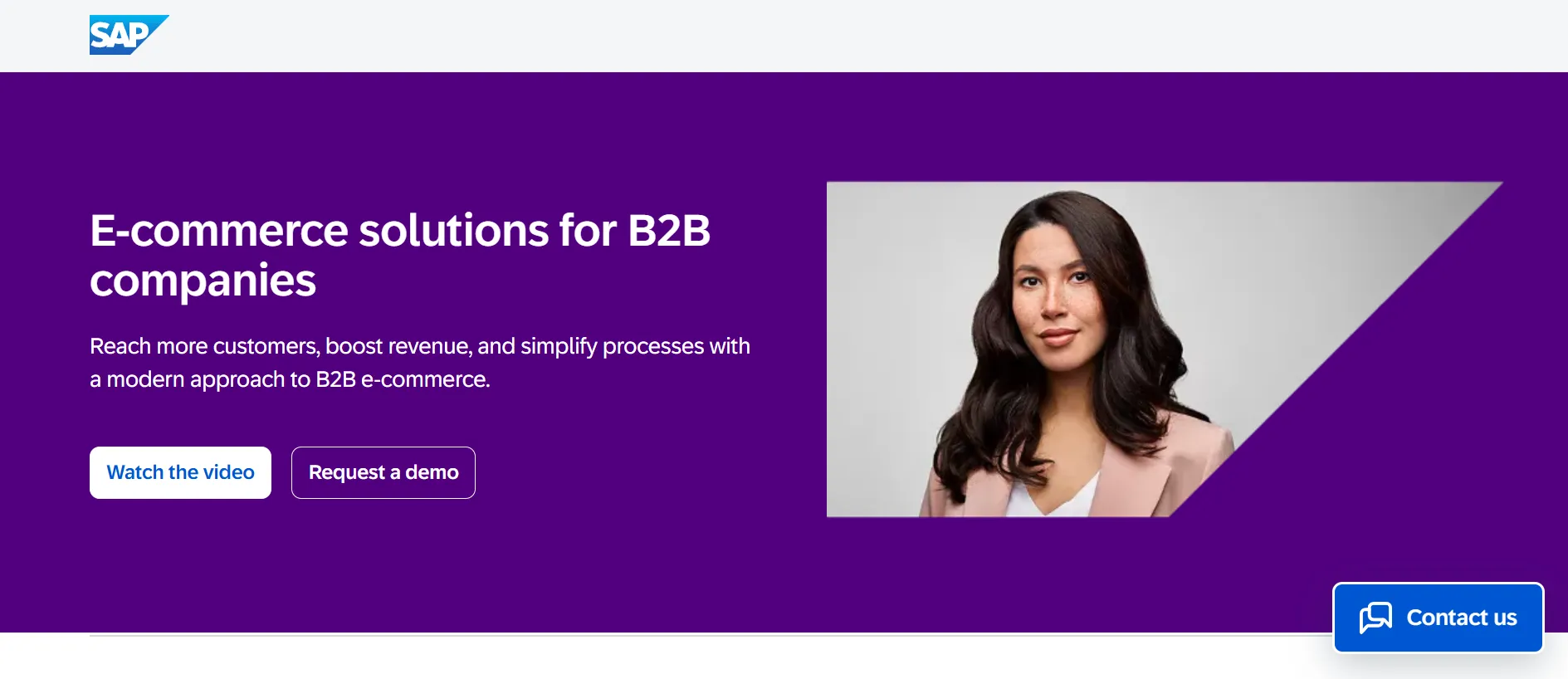
Key features of SAP Commerce Cloud
- Seamless SAP ERP and CRM integration: Sync customer data, pricing, inventory, and orders in real-time with SAP’s ecosystem.
- Custom pricing and contract management: Offer customer-specific pricing, volume-based discounts, and contract-based rates for B2B buyers.
- Intelligent product catalog and search: Use AI-driven search, dynamic filtering, and advanced product categorization to improve the buying experience.
- Built-in quotation and approval workflows: Support complex quote management and multi-step approval processes that reflect enterprise-level procurement and negotiation cycles.
- Organization-level budgeting and controls: Set spending limits, approval rules, and budgets per department or buyer to maintain financial discipline and compliance.
- AI-powered personalization: Leverage machine learning to deliver personalized product recommendations, targeted promotions, and customized experiences.
Given its deep integration with SAP’s ecosystem and its enterprise-grade feature set, SAP Commerce Cloud comes with a premium price tag. Plans typically start at around $100,000 per year and can reach over $300,000 annually, depending on the scale of operations, transaction volume, and customization needs.
7. Sana Commerce
📌 Key takeaway
Sana Commerce takes a different route from most B2B platforms – instead of syncing with your ERP, it’s built directly on top of it. That means your pricing, inventory, and customer data always stay accurate and up to date.
Sana Commerce is the best B2B eCommerce platform for businesses that want a direct connection between their online store and ERP system. It integrates with Microsoft Dynamics and SAP, removing complex middleware and ensuring real-time accuracy in pricing, inventory, and customer data. This setup gives B2B companies a simple and cost-effective way to manage digital sales while keeping everything precise and reliable.
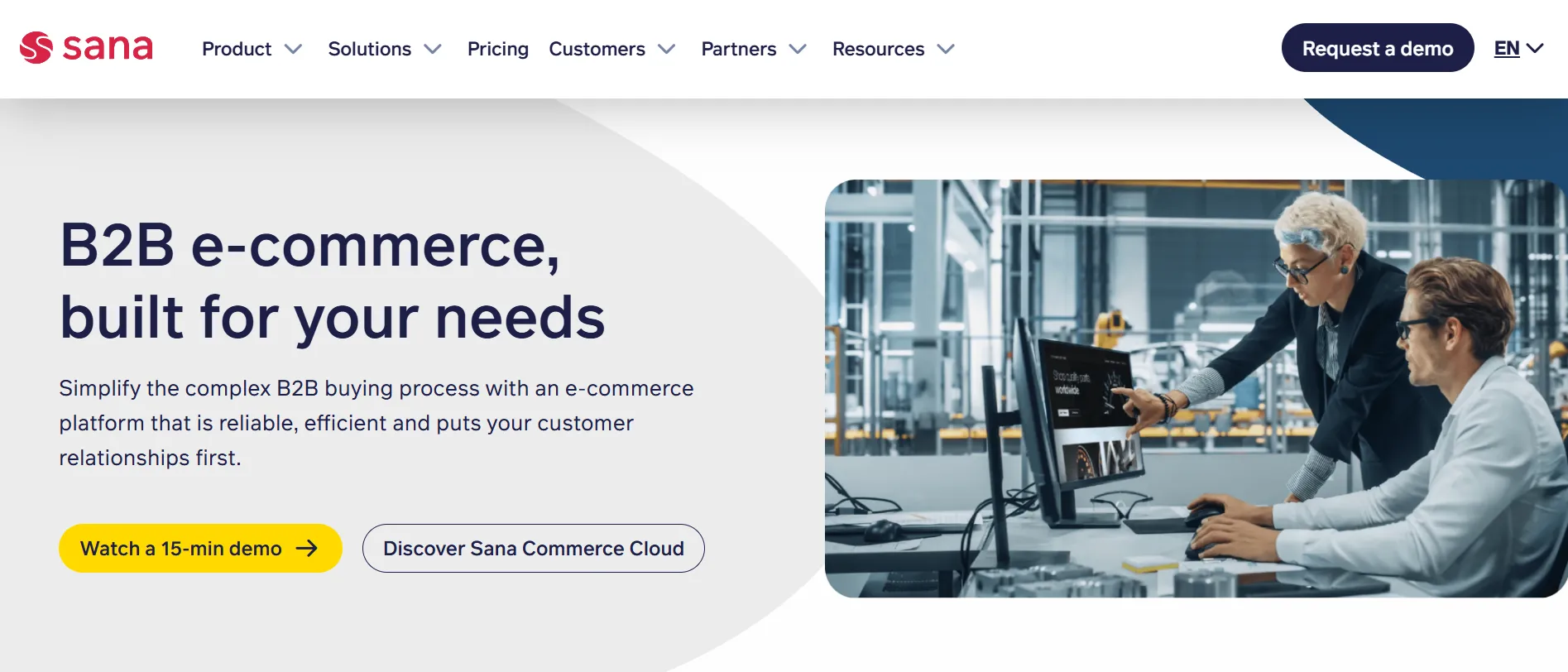
Sana Commerce Cloud Features
- Real-time ERP integration: The platform connects directly with Microsoft Dynamics and SAP ERP systems, ensuring data consistency across all channels.
- Automated order processing: Orders placed online sync instantly with ERP data, reducing manual work and improving order accuracy.
- Seamless product data synchronization: Product information, specifications, and pricing stay updated in real-time with ERP data.
- Advanced security and compliance: The platform ensures secure transactions, data protection, and compliance with industry standards.
Pricing for Sana Commerce typically ranges from $1,399 to $2,699 per month, depending on the features and ERP integration level. While it’s less expensive than most enterprise-grade platforms like SAP or Adobe Commerce Cloud, it’s still a serious investment for mid-market businesses.
However, for companies already using Microsoft Dynamics or SAP ERP, the tight native integration and reduced development time can make it a highly cost-effective choice.
8. NuORDER
NuORDER reimagines wholesale selling with a focus on experience and speed. For mid-market businesses in fashion, lifestyle, or consumer goods, it’s an intuitive, visually engaging platform that makes B2B buying feel effortless.
Now part of Lightspeed, NuORDER brings a fresh, visually-driven approach to B2B eCommerce. It transforms traditional wholesale operations into interactive digital showrooms where buyers can browse, customize, and order in real time. With its cloud-based foundation and strong ERP connectivity, NuORDER is especially suited for industries like fashion and consumer goods, where presentation and speed drive every sale.
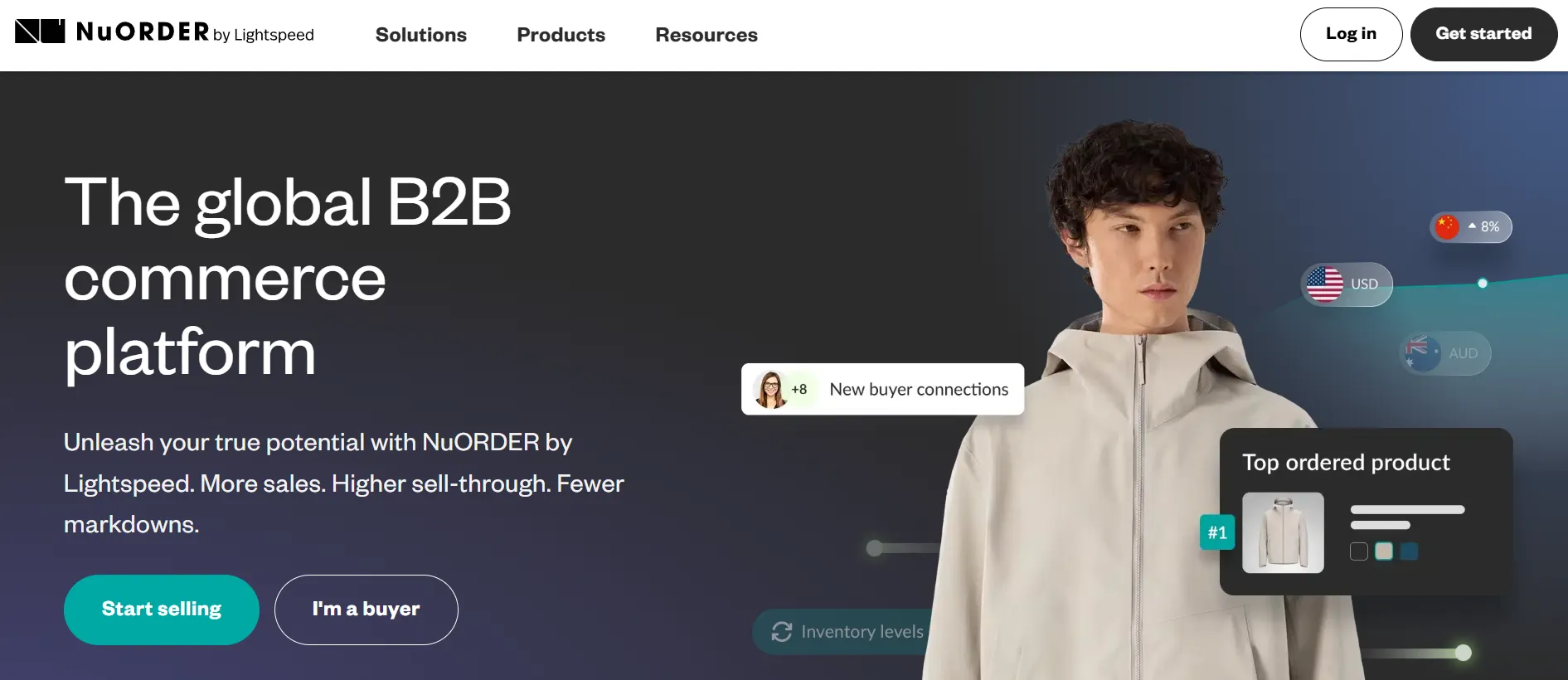
Key features of NuORDER
- Digital showroom and catalogs: Enable brands to showcase products with high-quality visuals, interactive lookbooks, and real-time inventory tracking.
- Custom pricing and tiered discounts: Offer customer-specific pricing, volume-based discounts, and exclusive promotions for different buyers.
- Real-time inventory and product updates: Ensure accurate stock availability, product changes, and order fulfillment updates with live ERP integration.
- AI-powered sales insights: Use data-driven analytics to track sales trends, forecast demand, and optimize wholesale strategies.
For typical mid-market setups, NuORDER’s pricing for B2B businesses tends to fall in the range of $7,000–$25,000 per year. While additional costs may apply for advanced integrations or API access, NuORDER remains a strong choice for brands that prioritize a modern, digital showroom experience and efficient wholesale management.
9. OroCommerce
📌 Key takeawayOroCommerce stands out for giving B2B sellers complete freedom and control. It’s a strong choice for manufacturers and wholesalers who value flexibility over simplicity.
OroCommerce is a purpose-built B2B eCommerce platform created specifically for complex business transactions. It gives businesses the freedom to manage complex workflows, pricing rules, and customer accounts with ease. As an open-source solution, it offers full control over integrations and design, making it ideal for wholesalers and manufacturers that need a flexible, highly customizable platform.
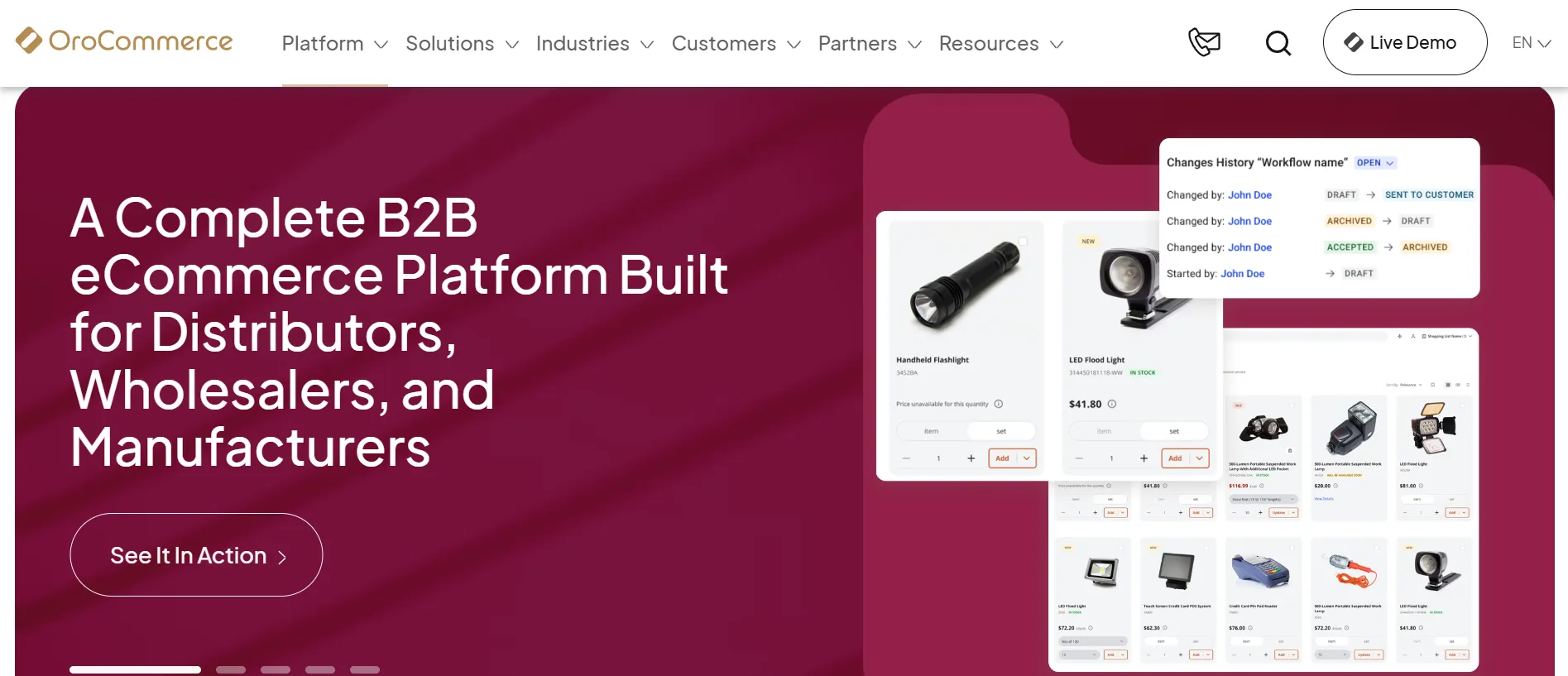
Key features of OroCommerce
- Advanced account management: Companies can create corporate accounts with multiple buyers, assigned roles, and structured approval workflows.
- Multi-store and multi-currency support: OroCommerce allows businesses to manage multiple B2B storefronts with region-specific pricing, tax rules, and languages.
- Seamless ERP and CRM integrations: OroCommerce connects with OroCRM, SAP, Microsoft Dynamics, NetSuite, and other business tools.
- Multi-warehouse and inventory management: Businesses can optimize inventory with real-time stock tracking across multiple warehouses.
Pricing for OroCommerce typically starts at around $3,000 per month and scales based on transaction volume, number of admin users, and hosting preferences. Since the platform operates on a custom quote-based model, businesses will receive tailored pricing depending on their setup and growth needs.
10. Cloudfy
📌 Key takeawayCloudfy focuses on simplicity and speed, helping B2B businesses get online quickly without losing essential functionality. Its built-in automation, real-time inventory syncing, and ERP connectivity make it a great fit for growing manufacturers and wholesalers.
Cloudfy is a fully managed B2B eCommerce platform built to help manufacturers and wholesalers move online quickly without heavy customization. Its cloud-based setup comes ready with core B2B features, from automated orders to real-time inventory updates. Designed for growing businesses, Cloudfy combines scalability, speed, and easy ERP integration to simplify operations and deliver a smoother buying experience.
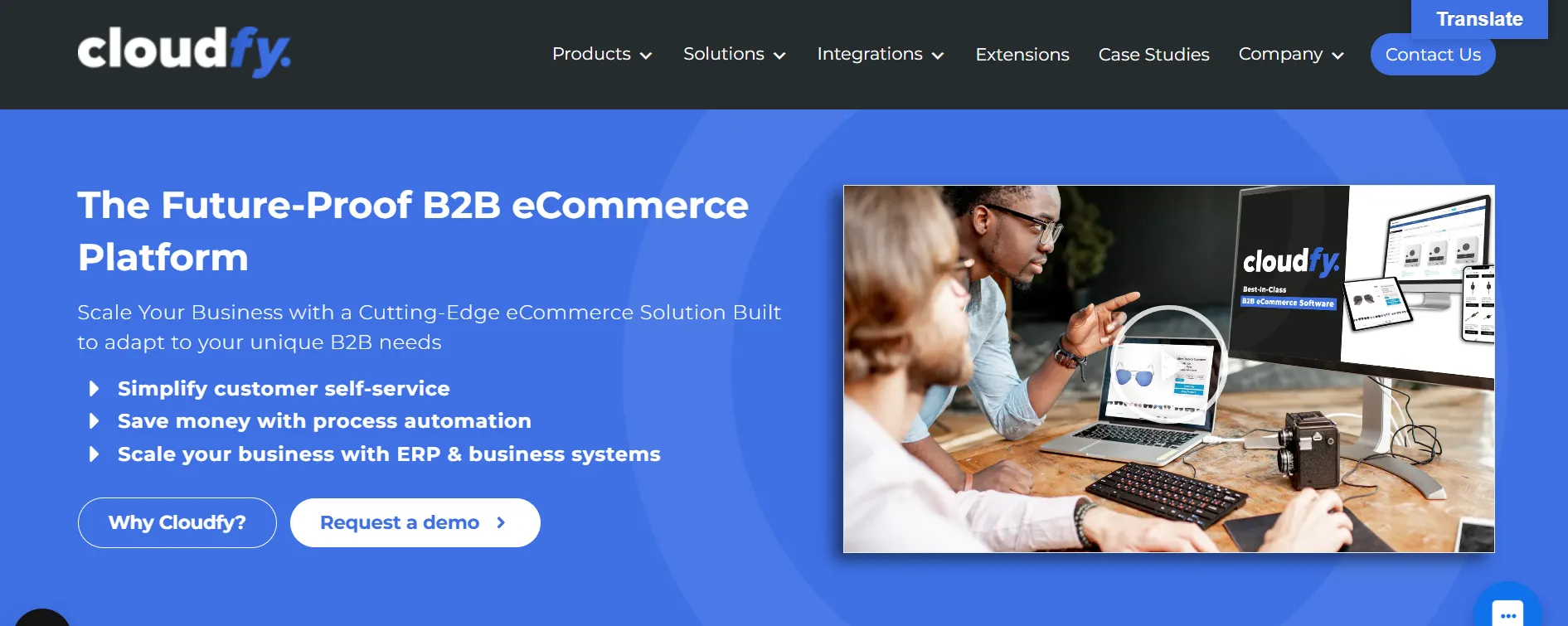
Key features of Cloudfy
- Automated order & quote management: The platform streamlines quote requests, approvals, and order processing, reducing manual tasks.
- Real-time inventory management: Cloudfy provides live stock updates and multi-warehouse tracking to prevent overselling and delays.
- AI-powered product recommendations: The platform enhances the buyer journey with automated product suggestions, upselling, and cross-selling.
- Headless commerce & API-first architecture: Businesses can extend functionalities and integrate with third-party apps, logistics platforms, and payment gateways.
Cloudfy has three plans for B2B businesses – Core, Pro, and Enterprise. The detailed pricing is not public, but the estimated range is between $1,000 and $6,000 per month, depending on order volume and required integrations. Compared to other mid-market platforms like OroCommerce or Sana Commerce, Cloudfy is slightly more affordable at the entry level but reaches a similar cost at its highest tier.
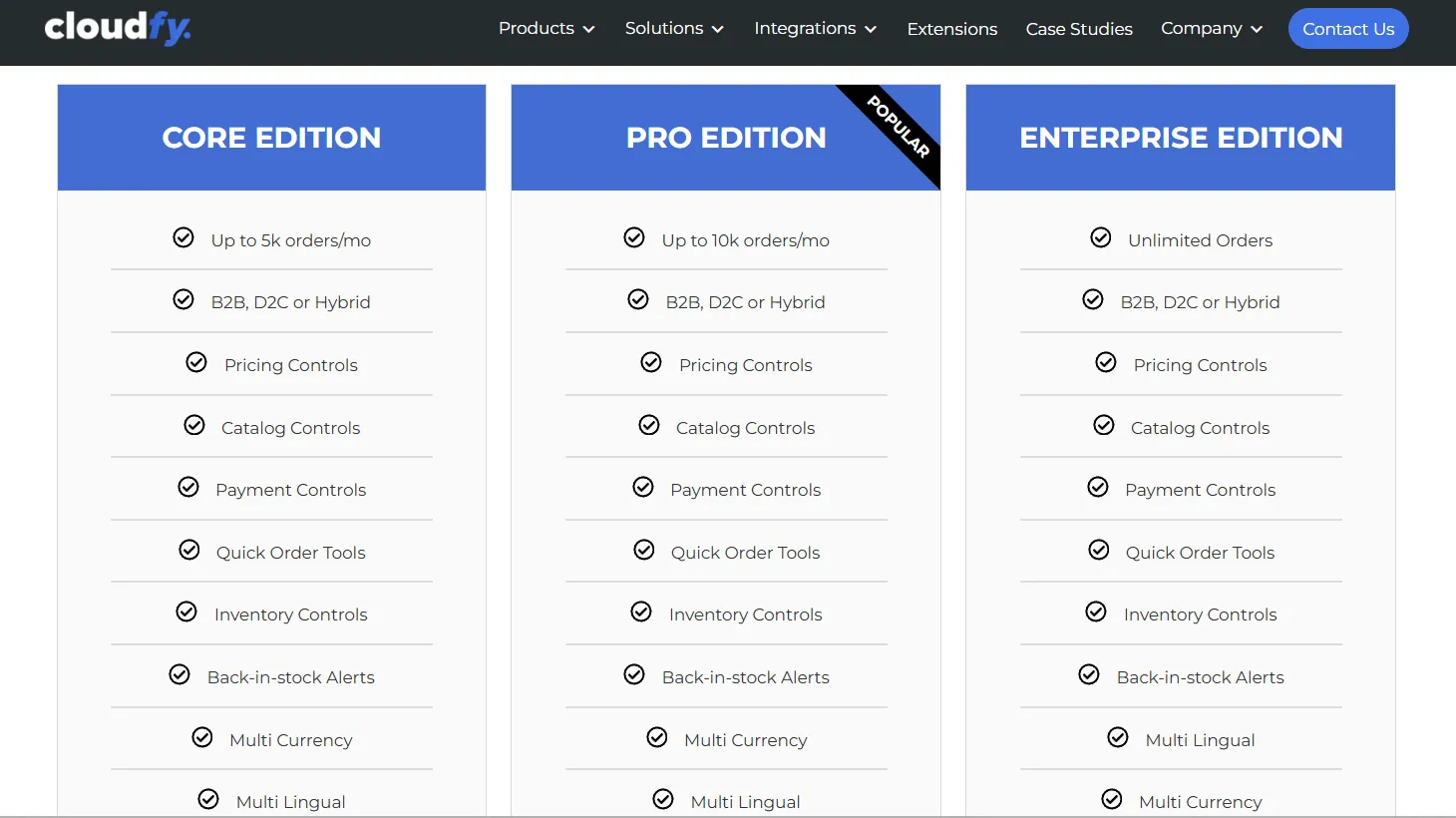
11. OpenCart
📌 Key takeaway:
OpenCart gives you the freedom to build your B2B store your way. It’s not packed with native B2B tools, but its open-source flexibility and wide extension marketplace let you add what you need as you grow.
For businesses seeking flexibility without high costs, OpenCart provides a customizable open-source foundation for B2B selling. It doesn’t include B2B tools by default, but its wide extension marketplace lets your teams add features as the business grows. This makes it a practical option for mid-market companies that value control and affordability.
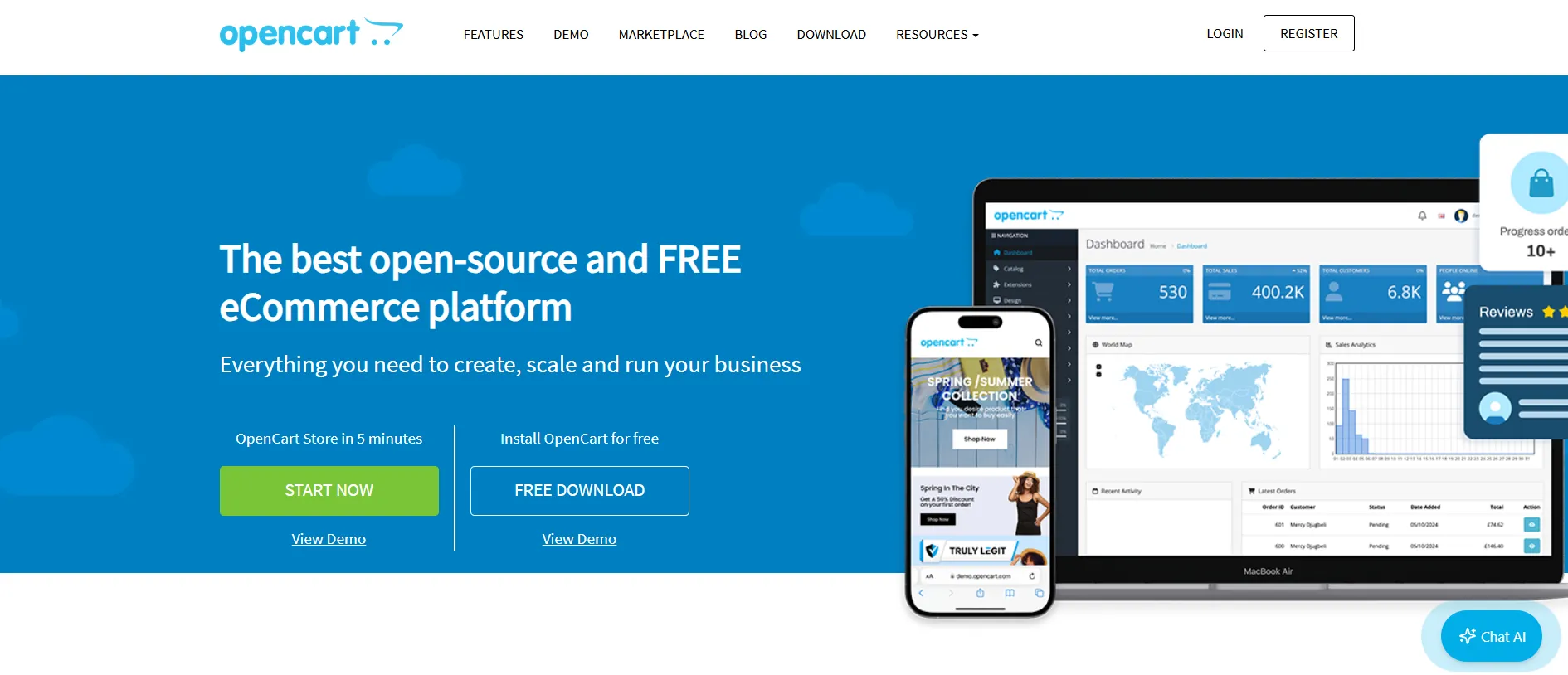
Key features that OpenCart
- Custom catalogs and pricing: Set up customer groups, assign special prices or discounts, and manage multiple price lists through extensions.
- Bulk ordering and reordering: Allow B2B buyers to order in large quantities and quickly reorder from past purchases.
- Quote and approval management: Enable customers to request quotes and negotiate before finalizing purchases using quote management modules.
- Multi-store and multi-language support: Manage several storefronts or regional stores from a single dashboard, ideal for global operations.
- Integration flexibility: Connect easily with ERP, CRM, and accounting systems through third-party modules or custom APIs.
- Open-source customization: Modify source code freely to build tailored workflows and B2B experiences suited to your business model.
As an open-source platform, OpenCart is free to download and use, but costs vary based on hosting, extensions, and customization. On average, mid-market businesses spend between $2,000 and $10,000 per year on development, maintenance, and premium modules.
12. Virto Commerce
📌 Key takeaway:
Virto Commerce strikes a rare balance between open-source freedom and enterprise-grade structure. Its modular, API-first design gives businesses the power to build exactly what they need. For mid-market and enterprise teams handling complex workflows or multiple storefronts, it offers the flexibility to innovate without losing stability or control.
Virto Commerce is an open-source .NET-based platform built specifically for complex B2B, B2C, and D2C scenarios. It’s designed for mid-market and enterprise businesses that need flexibility, scalability, and complete control over their digital commerce architecture.
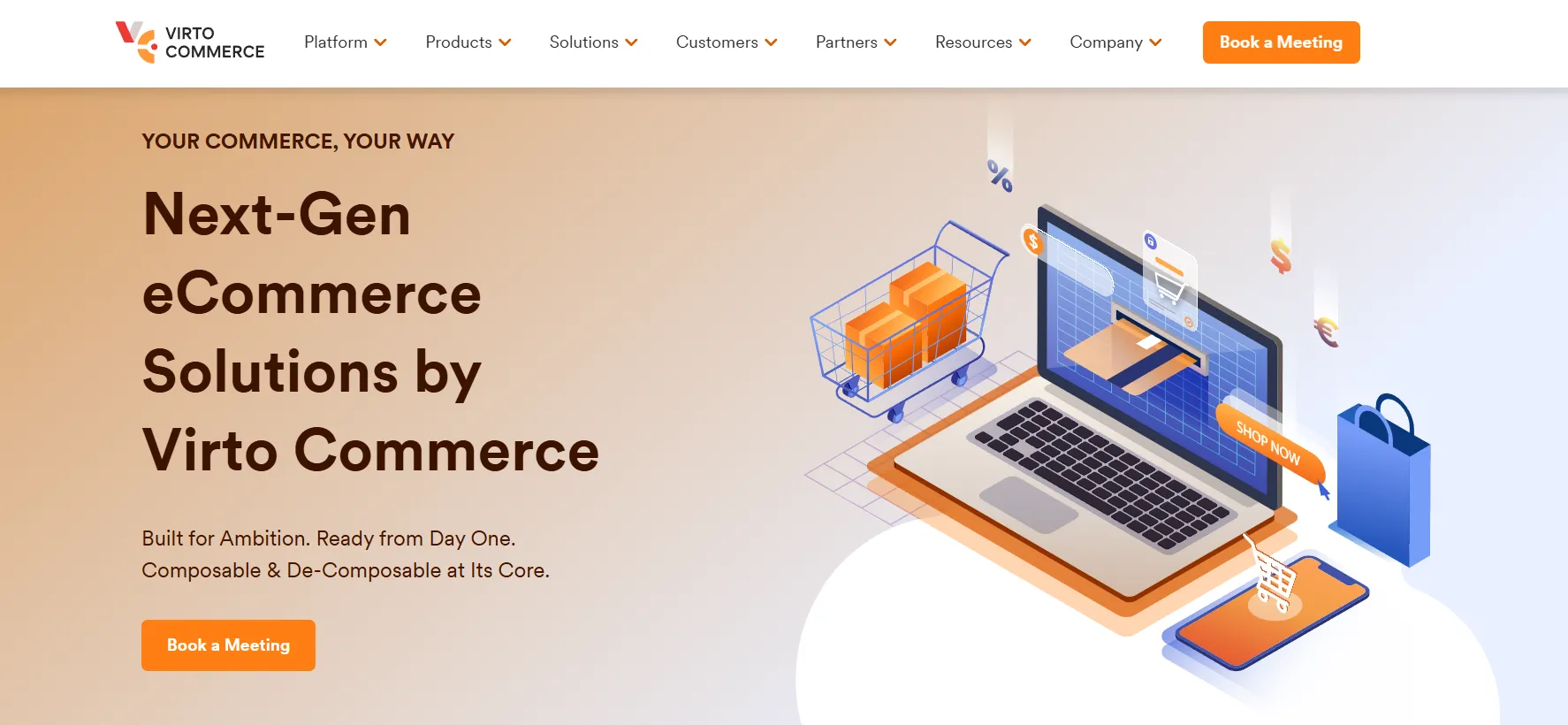
With its modular and API-first design, Virto enables companies to build tailored B2B experiences such as multi-tier account management, dynamic pricing, and advanced integrations. It is a strong choice for manufacturers, wholesalers, and distributors seeking open-source freedom with enterprise-grade stability.
Key features of Virto Commerce
- Modular, headless architecture: Build and extend B2B features independently without affecting other systems.
- Corporate account management: Manage complex buyer hierarchies, custom catalogs, and account-specific pricing.
- Dynamic pricing and promotions: Automate contract pricing, volume discounts, and customer-specific offers.
- Quotation and order workflows: Enable quote requests, approvals, and negotiated pricing for large or custom orders.
- Catalog and product information management: Maintain large catalogs with version control, grouping, and real-time updates.
- Marketplace and multi-store support: Operate multiple storefronts or marketplaces under a unified admin interface.
Virto Commerce uses a custom quote-based pricing model that varies by project scope, hosting type, and required modules. For mid-market businesses, the estimated cost ranges from $3,000 to $10,000 per month, including licensing and support.
How to Choose the Best B2B eCommerce Platform?
The best B2B eCommerce platform should act as the foundation for sustainable growth, not just a collection of features. With so many options available, the process can feel overwhelming. That’s why we’ve summarized the five key steps to help you make a confident, informed decision.
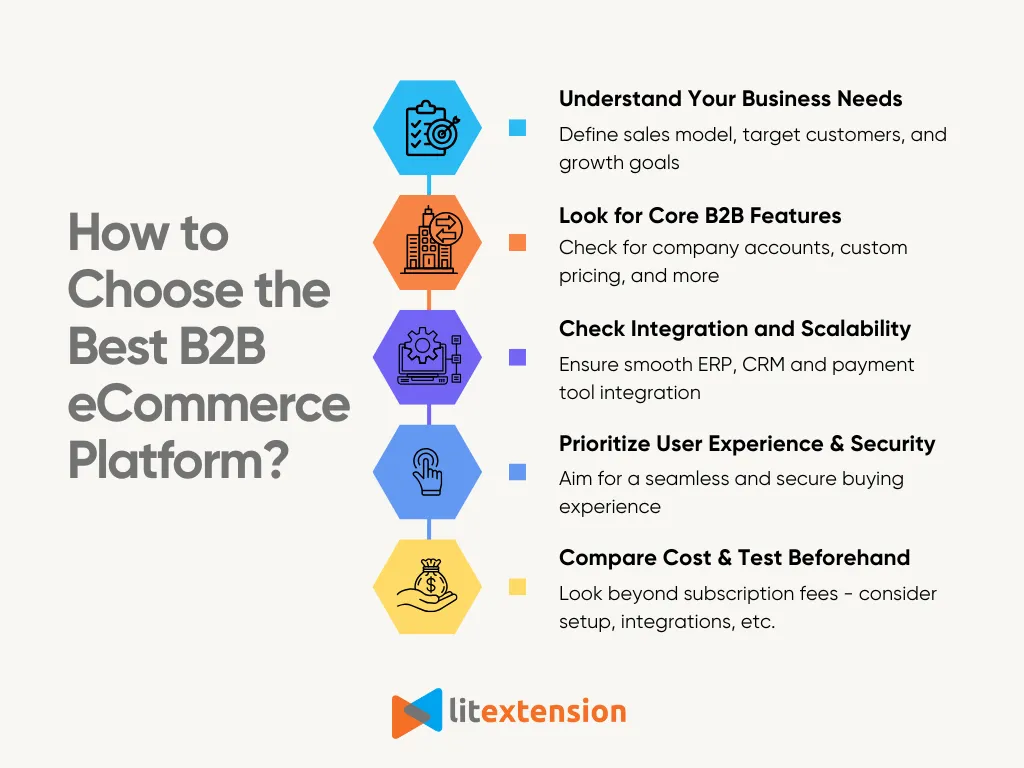
At its core, you need a solution that aligns with your business goals, integrates with your systems, and can scale as you grow. The ideal platform should make your buyers’ journey simple and secure while keeping your operations efficient behind the scenes. Taking the time to evaluate costs, test functionality, and see how each option performs in real use will help you invest confidently in a platform built for long-term success.
What are the essential features of a B2B eCommerce platform?
Below are the essential features of a B2B eCommerce platform:
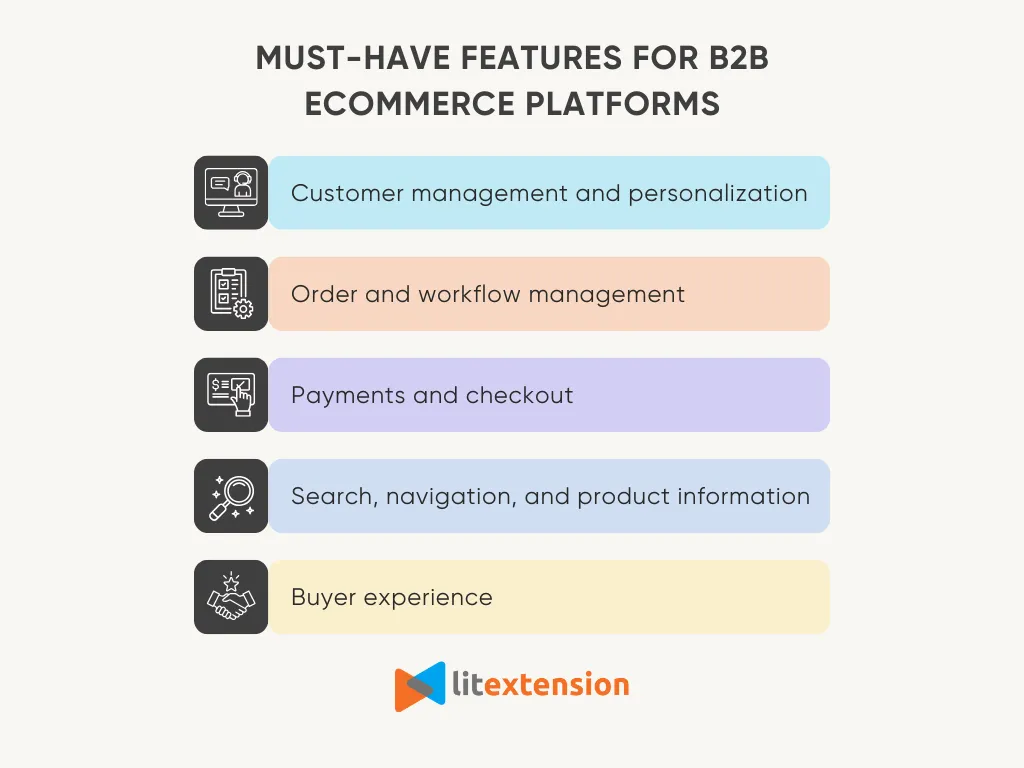
1. Customer management and personalization
In B2B, the customer is rarely a single buyer but an entire organization, such as a manufacturer, wholesaler, distributor, or retail chain. The best B2B eCommerce platform should make it easy to manage that complexity while keeping each experience personal.
- Corporate account management: A company organizes multiple buyers under one account to share histories, permissions, and budgets.
- Custom catalogs and pricing: Each customer sees exclusive products, prices, or discounts tailored to their contracts or roles.
- User roles and permissions: Administrators assign purchasing, approval, or management rights to users within the same organization.
2. Order and workflow management
Once relationships are in place, the next challenge is managing how orders move through them. A well-designed B2B eCommerce platform should adapt to how businesses actually buy, not force them to fit a rigid flow.
- Bulk ordering and reordering: Buyers can place repeat or bulk orders easily by reordering from their history or uploading item lists.
- Approval workflows: Managers or departments review and approve purchases before payment to match real-world buying processes.
- Request a quote: Buyers can negotiate prices for large or custom orders to combine online convenience with personal interaction.
- Minimum order quantities (MOQs): Sellers maintain profitability by setting required volume thresholds for specific products or categories.
3. Payments and checkout
Payments are where business trust becomes visible. In B2B, flexibility matters because every client has their own payment cycles and accounting requirements. The best B2B eCommerce platform makes this easy by offering:
- Flexible payment options: Clients can choose their preferred payment method, including credit cards, wire transfers, purchase orders, or invoice terms.
- Customized checkout: Buyers can complete purchases more easily with saved carts, multi-address shipping, or scheduled payments for recurring or multi-location orders.
4. Search, navigation, and product information
With large catalogs and detailed specs, you need to make it easy for buyers to find exactly what they’re looking for. We’ve seen that great navigation can make just as much difference as pricing or performance. Thus, we would score higher for platforms offering the following features:
- Bulk ordering and reordering: Buyers can place repeat or bulk orders easily by reordering from their history or uploading item lists.
- Approval workflows: Managers or departments review and approve purchases before payment to match real-world buying processes.
- Request a quote: Buyers can negotiate prices for large or custom orders to combine online convenience with personal interaction.
- Minimum order quantities (MOQs): Sellers maintain profitability by setting required volume thresholds for specific products or categories.
5. Integrations and backend
A smooth customer experience depends on how well your backend systems connect. When data flows freely between departments, decisions get faster and operations more precise. To achieve that, you should look for these features:
- ERP and CRM integrations: Businesses sync customer, order, and inventory data to achieve full visibility and smooth coordination.
- Analytics and reporting: Companies generate insights on sales performance, customer behavior, and product trends to shape better strategies.
- Scalability: The platform supports expanding catalogs, customers, and traffic without affecting performance.
6. Buyer experience
Finally, everything ties together in the buying experience. Modern B2B buyers expect speed, transparency, and self-service – the same ease they find in B2C, but with the reliability of enterprise-grade systems. For this reason, you will want features like:
- Self-service portals: Customers manage their accounts, track orders, and place reorders anytime without assistance from the sales team.
- Mobile optimization: The website ensures smooth loading and easy navigation on both desktop and mobile devices.
- High-security standards: The system protects sensitive business and payment data through encryption, access control, and PCI DSS compliance.
These are the features we consider essential when evaluating B2B eCommerce platforms. In the next section, we’ll share the 12 best platforms for 2025, divided into two categories so that you can easily find the right fit for your goals.
Best B2B eCommerce Platforms: FAQs
What is B2B eCommerce?
B2B eCommerce (Business-to-Business electronic commerce) refers to online transactions between businesses – such as manufacturers selling to distributors, or wholesalers selling to retailers – through digital platforms. Instead of traditional sales reps and purchase orders, B2B eCommerce enables businesses to manage orders, pricing, catalogs, and accounts online.
Is Shopify suitable for B2B?
Yes, especially Shopify Plus. It now includes native B2B features like customer-specific pricing, quantity rules, draft orders, purchase order support, and custom catalogs. With Shopify’s intuitive interface and app ecosystem, it’s a strong option for wholesalers and brands expanding into B2B.
What is the best B2B eCommerce platform?
- For enterprises, top options include Shopify Plus, BigCommerce, Adobe Commerce Cloud – offering robust features, ERP integration, and high scalability.
- For mid-market and niche brands, platforms like Sana Commerce and OroCommerce offer strong B2B tools without enterprise-level complexity.
How do I start a B2B eCommerce business?
Starting a B2B eCommerce business requires careful planning and the right technology. Follow these steps:
- 1. Identify your niche and target audience
- 2. Choose a B2B eCommerce platform
- 3. Set up your online store
- 4. Integrate essential business systems
- 5. Optimize for B2B buyers
- 6. Market your business
- 7. Streamline operations and scale
Final Thoughts
Hopefully, this article has helped you better understand the options available and what to look for when choosing the best B2B eCommerce platform for your business. The right B2B commerce solution helps your business sell smarter, connect better, and scale faster as you move toward larger and more complex operations.
If you’re planning to move your store to one of these best eCommerce platforms, LitExtension can help you get there seamlessly. We ensure your products, customers, orders, and other data are safely transferred without downtime or data loss, so you can focus on growing your B2B business instead of worrying about the technical process.
Lastly, don’t forget to check out our blog posts for more expert insights on other platforms and join the community group for real-user reviews.
🔗 Related Articles:

